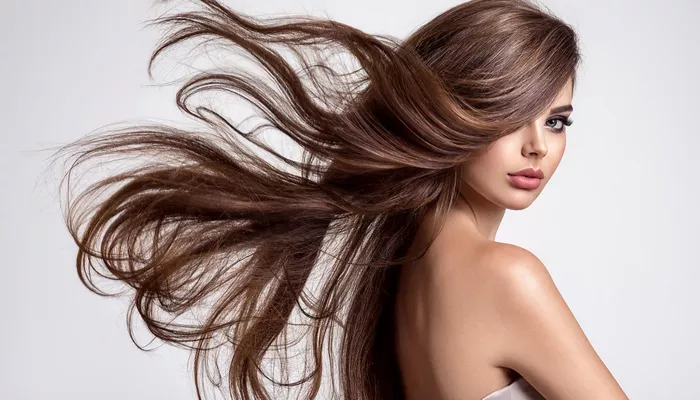Hair fall is a common concern for many, and it often becomes more apparent during daily hair care routines like brushing. If you’ve ever wondered, “Why does my hair fall out when I brush it?” you’re not alone. In this informative article, we’ll explore the reasons behind hair fall during brushing, how to minimize it, and tips for maintaining healthy, luscious locks.
Understanding the Hair Growth Cycle
To comprehend why hair falls out when brushing, it’s essential to grasp the natural hair growth cycle, which consists of several key phases:
1. Anagen Phase: This is the growth phase, where hair actively grows for an extended period.
2 .Catagen Phase: In this transitional phase, hair growth slows, and the hair follicle begins to shrink.
3. Telogen Phase: Hair is in a resting state during this phase, and it eventually sheds to make way for new hair growth.
4. Exogen Phase: This is the phase where hair sheds naturally and makes room for new hair growth.
When you brush your hair, you may encounter hairs in the exogen or shedding phase, which is a normal part of the hair cycle.
See Also: Is Losing Hair an Early Sign of Pregnancy: A Full Guide
Factors Contributing to Hair Fall During Brushing
Several factors can lead to increased hair fall while brushing:
1. Hair Type: Fine, fragile hair is more prone to breakage and may appear as excessive hair fall during brushing.
2. Brushing Techniques: Rough or aggressive brushing can lead to hair breakage. Opt for gentler brushing techniques.
3. Frequency: Brushing your hair too frequently can weaken hair, leading to increased hair fall.
4. Hair Health: Unhealthy hair, damaged by heat styling, chemicals, or a lack of proper care, is more likely to break and fall out when brushed.
5. Underlying Conditions: Certain medical conditions, like alopecia or thyroid disorders, can contribute to hair loss, making it more noticeable during brushing.
How to Minimize Hair Fall During Brushing?
While some hair fall during brushing is normal, there are steps you can take to minimize it:
1. Use the Right Brush: Opt for a brush with soft bristles or wide-toothed combs to reduce hair breakage.
2. Brushing Technique: Start at the tips of your hair and gently work your way up, rather than pulling from the roots.
3. Less Frequent Brushing: Avoid over-brushing your hair, as this can weaken it. Aim for a balance that suits your hair type.
4. Maintain Hair Health: Regularly trim split ends, and use protective products to prevent damage from heat styling and chemical treatments.
5. Balanced Diet: Nutrient-rich foods can contribute to healthier hair. Ensure you’re getting a variety of vitamins and minerals in your diet.
Addressing Underlying Causes of Hair Fall
If you notice excessive hair fall during brushing that seems unrelated to the factors mentioned above, it may be time to consult a healthcare professional. They can help you identify and address potential underlying causes, such as:
1. Hormonal Imbalances: Hormone-related conditions, like thyroid disorders or polycystic ovary syndrome, can lead to hair loss.
2. Nutritional Deficiencies: Lack of essential nutrients, particularly biotin, can contribute to hair fall.
3. Alopecia: Conditions like androgenetic alopecia or alopecia areata may require specific treatments and management strategies.
4. Stress Management: High stress levels can disrupt the hair growth cycle. Stress-reduction techniques can be beneficial.
5. Medication Side Effects: If you’re taking medications, certain drugs can lead to hair loss as a side effect. Consult with your healthcare provider if you suspect this is the case.
Tips for Maintaining Healthy Hair
In addition to reducing hair fall during brushing, maintaining overall hair health is crucial. Consider these tips:
1. Scalp Care: Keep your scalp clean and well-moisturized. A healthy scalp provides a nurturing environment for hair growth.
2. Avoid Excessive Heat Styling: Limit the use of hot tools like hairdryers, straighteners, and curling irons, as they can damage your hair.
3. Avoid Harsh Chemicals: Be cautious with hair products that contain harsh chemicals. Choose sulfate-free shampoos and conditioners.
4. Protect from UV Damage: Protect your hair from the sun’s harmful UV rays by using UV-blocking hair products or wearing a hat.
5. Regular Trims: Get regular trims to remove split ends and prevent further damage to your hair.
In conclusion
Experiencing some hair fall when you brush your hair is normal, as it’s often a part of the natural hair growth cycle. However, if you notice excessive or unusual hair fall, it’s essential to consider various factors, including your brushing technique, hair health, and underlying medical conditions. By following proper hair care practices and addressing potential causes of hair fall, you can maintain healthier, fuller hair.


